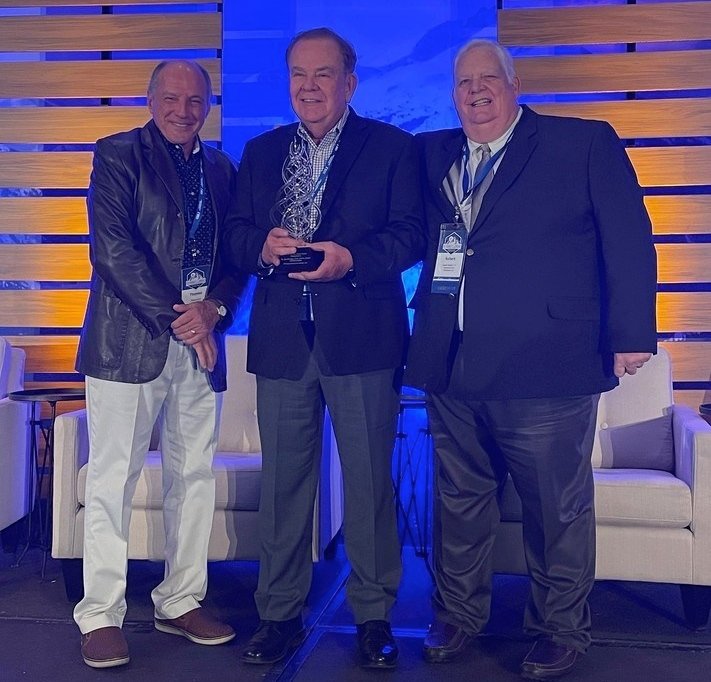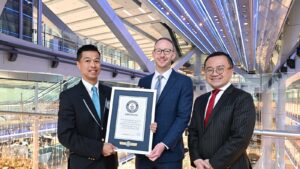Distinguished insurance professional R. Jan Pinney, CLU, ChFC, CPCU, was honored as the 2021 LIDMA Vision Award winner at the Life Insurance Direct Marketing Association 18th annual Fall Meeting & Business Showcase held recently in Denver.
Shown at left: 2019 Vision Award Recipient Tommy Lane, left, presented R. Jan Pinney with the 2021 LIDMA Vision Award along with LIDMA President Robert Bland, right. Image courtesy LIDMA.
The fall event is the insurance industry’s top annual meeting for producers, direct marketers and agencies involved in direct response sales and processing, and the LIDMA Vision Award, in honor of Pat Wedeking, recognizes people and organizations that make substantial contributions to the advancement of the direct response segment of the life insurance industry. It is the highest honor that LIDMA can bestow on an individual or organization.
Pinney served as 2018-19 President of LIDMA. He is the CEO and Founder of Pinney Insurance Center, Inc., a life insurance sales organization and ISU Francis-Pinney Insurance Services, Inc., a property and casualty agency, both located in Roseville, Calif.
“I’ve learned the only people who buy life insurance are people of character who love somebody,” Pinney said. “For 20 years LIDMA has been the preeminent leader in creating innovative processes and technology to make the act of acquiring life insurance easier and more efficient for the consumer. It is particularly humbling to receive the LIDMA Vision Award from such a cutting-edge organization that is packed with visionaries at every level.”
The LIDMA Vision Award winner is selected based upon several criteria:
- Innovation in improving the process of how life insurance is delivered to middle America
- Dedication to LIDMA and the mission to distribute more life insurance, enhance industry profitability and protect more American families
- Integrity in combining a keen business sense with care for other people, kindness, and a passion for the benefits of life insurance
A 46-year life and qualifying member of the Million Dollar Round Table (MDRT), Pinney also is an 18-year member of MDRT’s Top of the Table. He has served as president of the Sacramento Association of Insurance and Financial Advisors and was 2004-2005 President of the National Association of Insurance and Financial Advisors for California where he testified before Assembly and Senate committees on insurance and finance, and from which he received the Distinguished Service Award in 2011.
He received national attention for various issues discussed during his tenure on the Roseville Joint Union High School District Board of Trustees. He has also testified before Assembly and Senate committees on insurance and finance. Pinney is a prominent and active figure within the insurance industry where he advocates at the state and national levels for common-sense laws, transparency in regulator oversight, and a consumer-first focus on insurance company product designs, sales distribution, and consumer protection.
Most recently, he has led a coalition of NAILBA, LIDMA, and NAIFA leaders in fighting for an insurance agent exemption to the TCPA Laws that currently prevent a licensed agent from contacting a consumer (their client) regarding an existing insurance policy via telephone without written permission. Under the current rules, agents may only have telephone contact with their clients without written permission for a period of 18-months from the inception of a new insurance policy or are subject to fines.
Pinney continues to contribute countless time and energy to further his commitment to advancing the life insurance direct marketing channel. His passion led the LIDMA Board of Directors to engage LIDMA’s legal counsel, Locke Lord in advocating for change in TCPA definitions as related to the life insurance industry.
New Federal Communications Commission nominees were just named on October 26, 2021 in what has been a historically long wait by the new Administration.
LIDMA continues to await the confirmation of a new FCC Commissioner for its petition joined by NAIFA, NAILBA and the Association for Advanced Life Underwriting filed on June 18, 2018 for an expedited Clarification of one of the Commission’s do-not-call requirements and clarification or ruling that life insurance agents and brokers are permitted to call their customers while the life insurance policies sold are in effect and for a period of 18-months after the policies expire based upon an established business relationship (EBR) between life insurance agents and their customers.
On November 9, 2018 petitioners joined Pinney at the FCC to make oral arguments related to the expedited ruling on EBR concerns. Finally, as an alternative to an expedited ruling on the EBR decision requested in the Petition, a statement of non-enforcement was discussed where Petitioners seek a pronouncement that no enforcement or other legal action can be taken pending clarifying guidance from the Commission. The American Council of Life Insurers added their support to the Agent’s EBR Petition in February 2019.
LIDMA also initiated filing a U.S. Supreme Court Amici Brief in Facebook v Dugan regarding the definition of robo-dialers on September 10, 2020. The petitioners included LIDMA, the American Property and Casualty Insurance Association and Consumer Credit Industry Association in support of the petitioner.
On April 1, 2021 the Supreme Court unanimously sided with Facebook and its petitioners. The court adopted a narrow reading of a key definition in the federal ban on robocalls and robotexts to cellphones. It held that to qualify as an “automatic telephone dialing system” under the Telephone Consumer Protection Act, a device must have the capacity either to store, or to produce, a telephone number using a random or sequential number generator—a type of obsolescent marketing technology.
The decision is likely to have major implications for the future of telemarketing. Of most import, it means that the act does not ban the use of now-dominant predictive dialing technology that can call or text targeted customers, including technology that relies on the massive amounts of data now collected on American consumers, so long as an artificial or pre-recorded voice is not used. In so holding, the justices made clear that it’s the job of Congress, not the court, to update statutes in the face of technological change.













